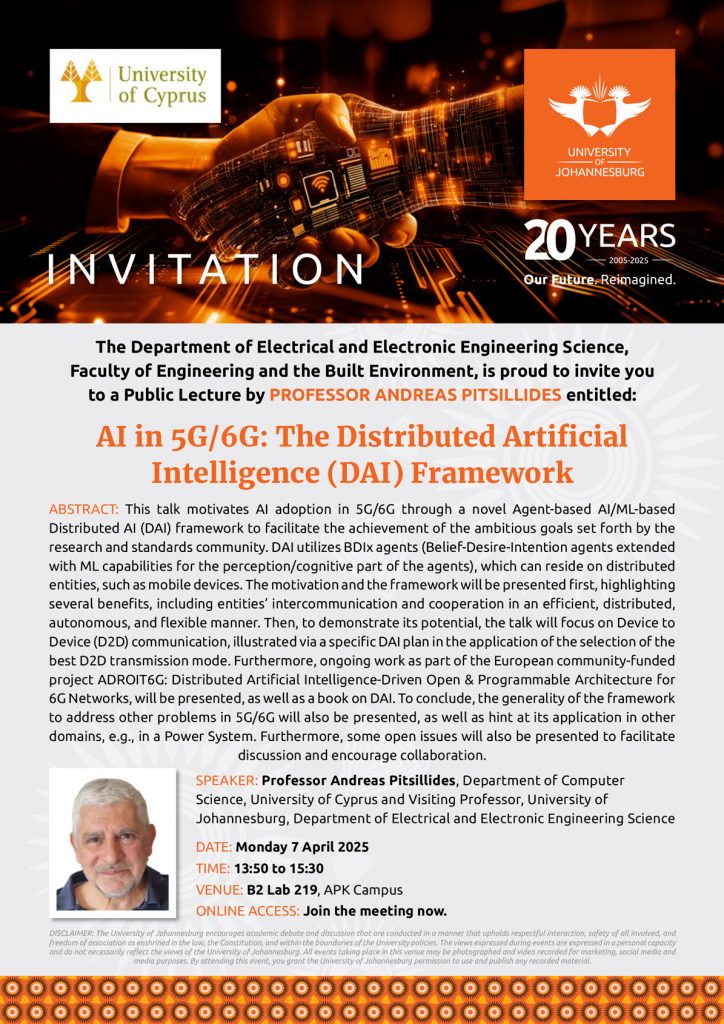AI in 5G/6G: The Distributed Artificial Intelligence (DAI) Framework

Abstract:
This talk motivates AI adoption in 5G/6G through a novel Agent-based AI/ML-based Distributed AI (DAI) framework to facilitate the achievement of the ambitious goals set forth by the research and standards community. DAI utilizes BDIx agents (Belief-Desire-Intention agents extended with ML capabilities for the perception/cognitive part of the agents), which can reside on distributed entities, such as mobile devices. The motivation and the framework will be presented first, highlighting several benefits, including entities’ intercommunication and cooperation in an efficient, distributed, autonomous, and flexible manner. Then, to demonstrate its potential, the talk will focus on Device to Device (D2D) communication, illustrated via a specific DAI plan in the application of the selection of the best D2D transmission mode. Furthermore, ongoing work as part of the European community-funded project ADROIT6G: Distributed Artificial Intelligence-Driven Open & Programmable Architecture for 6G Networks, will be presented, as well as a book on DAI (). To conclude, the generality of the framework to address other problems in 5G/6G will also be presented, as well as hint at its application in other domains, e.g., in a Power System. Furthermore, some open issues will also be presented to facilitate discussion and encourage collaboration.
Andreas Pitsillides is a Professor Emeritus in the Department of Computer Science, University of Cyprus, was head of the Networks Research Laboratory and was appointed Visiting Professor at the University of the Johannesburg, Department of Electrical & Electronic Engineering Science, South Africa (2020-2024). His broad research interests include communication networks (fixed and mobile/wireless), Nanonetworks and Software Defined Metamaterials and their applications in communication problems (Programmable Wireless Environments/Intelligent Reconfigurable Surfaces) the Internet of Things, Smart Spaces (Home, Grid, City), and Internet technologies and their application in Mobile e-Services, especially e-health, and security. He has a particular interest in adapting tools from various fields of applied mathematics such as adaptive non-linear control theory, computational intelligence, game theory, and nature-inspired techniques, to solve problems in communication networks, and lately Distributed AI (DAI). Published over 370 refereed papers in flagship journals (e.g. IEEE, Elsevier, IFAC, Springer), international conferences and book chapters, 3 books (one edited), participated in over 35 European Commission and locally funded research projects as principal or co-principal investigator, received several awards, including best paper, presented keynotes, invited lectures at major research organizations, short courses at international conferences and short courses to industry, and serves/served on several journal and conference executive committees.
Disclaimer: The University of Johannesburg encourages academic debate and discussion that are conducted in a manner that upholds respectful interaction, safety of all involved, and freedom of association as enshrined in the law, the Constitution, and within the boundaries of the University policies. The views expressed during events are expressed in a personal capacity and do not necessarily reflect the views of the University of Johannesburg.

